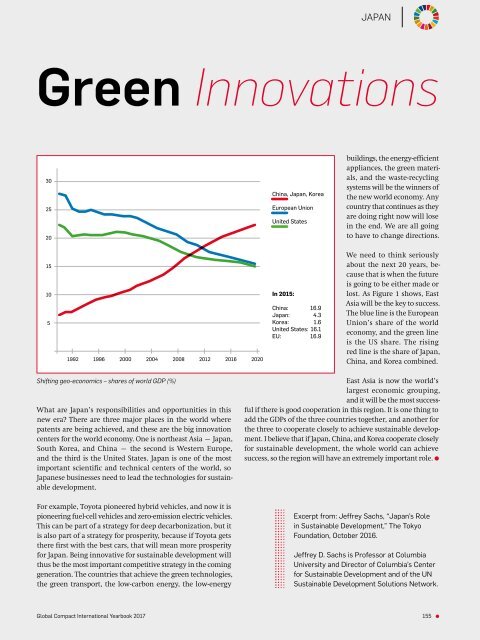Sustainability in Troubled Times
We live in times of uncertainty and global (dis)order. „Understanding global mega-trends is crucial. We live in times of multiple, evolving and mutually-reinforcing shifts“, says UN Secretary-General António Guterres. He adds: „These dynamics, of geopolitical, demographic, climatic, technological, social and economic nature, enhance threats and opportunities on an unprecedented scale.“ Therefore sustainability in troubled times is the key topic of this Sustainability Yearbook 2017, edited by macondo publishing. In the opening essay, Elmer Lenzen takes a critical look at the relationship between democracy and globalization. For decades this combination was a formula for success. Now both are experiencing troubled times. UN Global Compact founding director Georg Kell and Princeton professor Larry Diamond, who are well- known figures in this field, explain some of the reasons why in a profound interview. One reason is that today’s world is becoming more fragmented. So how can sustainability work in these times? It can work if we focus on the needs of the present without compromising the abilities of the future, says Global Compact Action Platform fellow Richard Roberts, and by utilizing the advantages of tomorrow. But doing the right thing in critical times is also a question of attitude. The entrepreneur Richard Branson and the actor Colin Firth both show in their own ways that sustainability means authenticity.
We live in times of uncertainty and global (dis)order. „Understanding global mega-trends is crucial. We live in times of multiple, evolving and mutually-reinforcing shifts“, says UN Secretary-General António Guterres. He adds: „These dynamics, of geopolitical, demographic, climatic, technological, social and economic nature, enhance threats and opportunities on an unprecedented scale.“ Therefore sustainability in troubled times is the key topic of this Sustainability Yearbook 2017, edited by macondo publishing.
In the opening essay, Elmer Lenzen takes a critical look at the relationship between democracy and globalization. For decades this combination was a formula for success. Now both are experiencing troubled times. UN Global Compact founding director Georg Kell and Princeton professor Larry Diamond, who are well- known figures in this field, explain some of the reasons why in a profound interview. One reason is that today’s world is becoming more fragmented. So how can sustainability work in these times?
It can work if we focus on the needs of the present without compromising the abilities of the future, says Global Compact Action Platform fellow Richard Roberts, and by utilizing the advantages of tomorrow. But doing the right thing in critical times is also a question of attitude. The entrepreneur Richard Branson and the actor Colin Firth both show in their own ways that sustainability means authenticity.
Create successful ePaper yourself
Turn your PDF publications into a flip-book with our unique Google optimized e-Paper software.
JAPAN<br />
Green Innovations<br />
30<br />
25<br />
20<br />
Ch<strong>in</strong>a, Japan, Korea<br />
European Union<br />
United States<br />
build<strong>in</strong>gs, the energy-efficient<br />
appliances, the green materials,<br />
and the waste-recycl<strong>in</strong>g<br />
systems will be the w<strong>in</strong>ners of<br />
the new world economy. Any<br />
country that cont<strong>in</strong>ues as they<br />
are do<strong>in</strong>g right now will lose<br />
<strong>in</strong> the end. We are all go<strong>in</strong>g<br />
to have to change directions.<br />
15<br />
10<br />
5<br />
1992 1996 2000 2004 2008 2012 2016 2020<br />
In 2015:<br />
Ch<strong>in</strong>a: 16.9<br />
Japan: 4.3<br />
Korea: 1.6<br />
United States: 16.1<br />
EU: 16.9<br />
We need to th<strong>in</strong>k seriously<br />
about the next 20 years, because<br />
that is when the future<br />
is go<strong>in</strong>g to be either made or<br />
lost. As Figure 1 shows, East<br />
Asia will be the key to success.<br />
The blue l<strong>in</strong>e is the European<br />
Union’s share of the world<br />
economy, and the green l<strong>in</strong>e<br />
is the US share. The ris<strong>in</strong>g<br />
red l<strong>in</strong>e is the share of Japan,<br />
Ch<strong>in</strong>a, and Korea comb<strong>in</strong>ed.<br />
Shift<strong>in</strong>g geo-economics – shares of world GDP (%)<br />
What are Japan’s responsibilities and opportunities <strong>in</strong> this<br />
new era? There are three major places <strong>in</strong> the world where<br />
patents are be<strong>in</strong>g achieved, and these are the big <strong>in</strong>novation<br />
centers for the world economy. One is northeast Asia – Japan,<br />
South Korea, and Ch<strong>in</strong>a – the second is Western Europe,<br />
and the third is the United States. Japan is one of the most<br />
important scientific and technical centers of the world, so<br />
Japanese bus<strong>in</strong>esses need to lead the technologies for susta<strong>in</strong>able<br />
development.<br />
For example, Toyota pioneered hybrid vehicles, and now it is<br />
pioneer<strong>in</strong>g fuel-cell vehicles and zero-emission electric vehicles.<br />
This can be part of a strategy for deep decarbonization, but it<br />
is also part of a strategy for prosperity, because if Toyota gets<br />
there first with the best cars, that will mean more prosperity<br />
for Japan. Be<strong>in</strong>g <strong>in</strong>novative for susta<strong>in</strong>able development will<br />
thus be the most important competitive strategy <strong>in</strong> the com<strong>in</strong>g<br />
generation. The countries that achieve the green technologies,<br />
the green transport, the low-carbon energy, the low-energy<br />
East Asia is now the world’s<br />
largest economic group<strong>in</strong>g,<br />
and it will be the most successful<br />
if there is good cooperation <strong>in</strong> this region. It is one th<strong>in</strong>g to<br />
add the GDPs of the three countries together, and another for<br />
the three to cooperate closely to achieve susta<strong>in</strong>able development.<br />
I believe that if Japan, Ch<strong>in</strong>a, and Korea cooperate closely<br />
for susta<strong>in</strong>able development, the whole world can achieve<br />
success, so the region will have an extremely important role.<br />
Excerpt from: Jeffrey Sachs, “Japan’s Role<br />
<strong>in</strong> Susta<strong>in</strong>able Development,” The Tokyo<br />
Foundation, October 2016.<br />
Jeffrey D. Sachs is Professor at Columbia<br />
University and Director of Columbia’s Center<br />
for Susta<strong>in</strong>able Development and of the UN<br />
Susta<strong>in</strong>able Development Solutions Network.<br />
Global Compact International Yearbook 2017 155

















